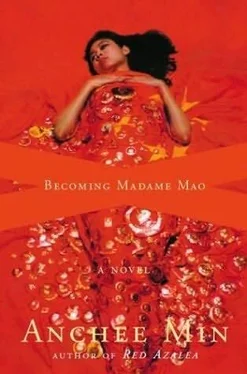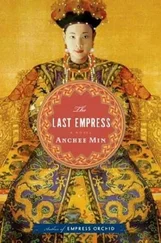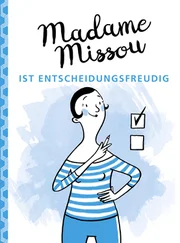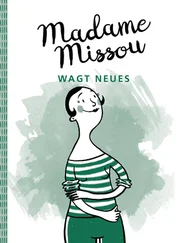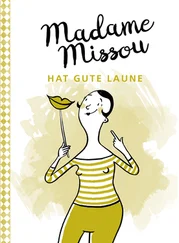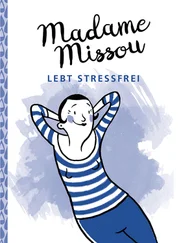Anchee Min - Becoming Madame Mao
Здесь есть возможность читать онлайн «Anchee Min - Becoming Madame Mao» весь текст электронной книги совершенно бесплатно (целиком полную версию без сокращений). В некоторых случаях можно слушать аудио, скачать через торрент в формате fb2 и присутствует краткое содержание. Жанр: Современная проза, на английском языке. Описание произведения, (предисловие) а так же отзывы посетителей доступны на портале библиотеки ЛибКат.
- Название:Becoming Madame Mao
- Автор:
- Жанр:
- Год:неизвестен
- ISBN:нет данных
- Рейтинг книги:4 / 5. Голосов: 1
-
Избранное:Добавить в избранное
- Отзывы:
-
Ваша оценка:
- 80
- 1
- 2
- 3
- 4
- 5
Becoming Madame Mao: краткое содержание, описание и аннотация
Предлагаем к чтению аннотацию, описание, краткое содержание или предисловие (зависит от того, что написал сам автор книги «Becoming Madame Mao»). Если вы не нашли необходимую информацию о книге — напишите в комментариях, мы постараемся отыскать её.
Becoming Madame Mao — читать онлайн бесплатно полную книгу (весь текст) целиком
Ниже представлен текст книги, разбитый по страницам. Система сохранения места последней прочитанной страницы, позволяет с удобством читать онлайн бесплатно книгу «Becoming Madame Mao», без необходимости каждый раз заново искать на чём Вы остановились. Поставьте закладку, и сможете в любой момент перейти на страницу, на которой закончили чтение.
Интервал:
Закладка:
It is after dinner. We are relaxing around the table having tea. Nah begs that we not talk about business, a request I must turn down. I count on the time I spend with Mao, because he may change his mind tomorrow. I have trained myself to always be prepared for the worst.
Nah dashes out of the room. Where are you going? I yell. Don't tell me you are going to waste time on knitting. Did you call the people I asked you to call for me? Answer me! You are sixteen years old, not six!
Leave her alone, her father says. He has had some wine and is in a good mood. He is in his usual pajamas and wears socks without sandals. The room is heated but still feels cold and empty. It doesn't seem like a home. It is more like a war headquarters with books, cigarette butts, towels and mugs lying carelessly around. He is comfortable with this on-the-move style. The walls are bare. I can't tell their original color. The color of dust. The floor is made of large gray-blue bricks. I once suggested that he install a wooden floor but he didn't want to bother. He still uses a mosquito net in the summer. His staff made one as big as a circus tent.
I have an important task for you, he says and puts down his tea.
My eyes widen and my lips tremble in excitement.
I have discussed with Kang Sheng that you will be the best candidate to take command on the ideology side of my business. What do you think?
For you, Mao Tse-tung, if your bomb misses a fuse I'll lay down my body.
May 16, after revising "The 5.16 Notification" seven times, Mao puts down his signature and entitles the document "The Manual of the Cultural Revolution." As it goes to press, Mao establishes a new cabinet apart from the existing Politburo. He calls it the Headquarters of the Cultural Revolution with himself as the chief, Jiang Ching as his right-hand person and Kang Sheng, Chen Bo-da and Chun-qiao as his key advisors.
From that moment on China is run by Madame Mao Jiang Ching with Mao behind her every move.
17
JUNE 1966. MY BURNING SUMMER. Although the path is rough, the future looks bright. In the past my name lacked authority. The opera producers and critics showed me little respect. They rewrote my scripts. I had to fight for every line and note. The ordinary folks thought of me as Mao's housewife. Except in Shanghai where Chun-qiao was in control, no one printed my words. Now that I have Mao's support, everyone is competing for my attention. The press, in my opinion, is like an infant-whoever offers it a nipple will be called mother. Cheap.
In Mao's name I organize a national festival-the Festival of Revolutionary Operas. I select potential operas and adapt them to serve Mao's purpose. I arrange talented artists to upgrade the pieces into high-quality extravaganzas, such as Taking the Tiger Mountain by Wit and The Sha Family Pond. I make the operas bear my signature and personally supervise every detail, from the selection of the actors to the way a singer hits the note.
There are quick learners and stubborn minds. I have to deal with them all. Not a day passes that I don't feel my enemy's shadow. When the resistance becomes strong and my projects face danger I phone Mao. This morning a couple of my playwrights have been taken away from their work. They were put into a detention house under an order placed by my enemy. The reason was vague-"They have not served the people with their hearts and souls." I have no idea who exactly is in charge of the opposition. Everything is done through students. There is a war zone here. My enemy has many faces. The students are being manipulated.
Mao comforts me by offering substantial help. Launch a campaign, he says. Establish your own force. Go to universities and speak at public rallies on my behalf. The goal is to get the students on our side.
The thirty-seven-day festival turns out to be a great success. Three hundred thirty thousand people are received. To add excitement Mao and his new cabinet attend my closing ceremony. Standing next to Mao in a brand-new grass-green army uniform I clap. When the curtain descends I weep in happiness. With "The Manual of the Cultural Revolution" being distributed in every commune, factory, campus and street, I have established my leadership. On my order, students, workers and peasants challenge the authorities. At rallies I recite Mao's poem into the microphone:
The brave winter plums blossom in the snow
Only the pitiful flies cry and freeze themselves to death!
The opposition shows no sign of quitting. Vice Chairman Liu organizes his own counterattack groups. His messengers are called the Work Team. Their purpose is to put out the "wildfires"-to destroy Madame Mao.
Yet she is not worried. Mao has confirmed his desire to beat Liu. Mao is determined to set Vice Chairman Liu himself on fire.
Last night she dreamed. She fumbled her way into her lover's arms, sobbing piteously. He comforted her as if she were a child. Her tears soaked into his shirt.
This morning they have breakfast together. Being in each other's presence has become a way to show affection. She doesn't tell him about her dream. His face is calm and patient. They eat quietly. He has bread and porridge with hot pepper, and she has milk and fruit with a piece of toast. The servants stand like trees. They watch the masters eating. If it were in her residence she would send them away. Mao is not bothered. He likes to have guards and servants standing in every corner of the room while he eats. He can be perfectly at ease having bowel movements in front of his guard.
So what is going on with the students? Mao asks, drinking up his ginseng soup noisily.
I've scouted a young man from Qinghua University, a seventeen-year-old chemistry student. His name is Kuai Da-fu.
I take pleasure in describing Kuai Da-fu. I discuss him as if he were my son. He has a thin face and an intense character. He has a pair of raccoon eyes and a large nose. His lips remind me of a dry riverbed. Mao laughs at this remark.
Go on, he says. Go on.
He is shy, vulnerable and yet full of passion. His frame is not strong. He is almost delicate. But he has the charisma of a teen idol. When he speaks, his eyes sparkle and his face blushes. Although he is inexperienced, his ambition and 'determination will guarantee him success.
Mao pushes away his bowl and lies back in his chair. He wants to know how I came to lay my eyes on him.
It was his reaction to "The 5.16 Notification," I explain. He created a big-character poster that attacked the head of the Work Team, a man named Yelin. He called Yelin a capitalism promoter. As a result he was expelled by the school and put under house arrest for eighteen days.
But the young man has committed no crime! Mao argues loudly as if to a crowd.
Yes, Kuai Da-fu admitted no guilt, Madame Mao continues. Instead, he formed a one-person hunger demonstration.
What fine material!
I thought so too.
He must be inspiring to others.
What should I do?
Visit him!
That is exactly what I did. I sent my agent Comrade Dong-you probably don't remember him, he used to work for Kang Sheng and is loyal. He looks so ordinary and boring that he blends into the crowds without arousing any suspicion.
Yes?
I told him that he has my support and yours. I asked him to hang on and take the opportunity to set himself as an example to the nation's youth.
It is at this moment Mao leans over and puts his hand on my shoulder. Rubbing gently he whispers, I feel blessed having you by my side. Are you exhausted? I don't want to work you to death. How about a vacation? I am leaving tomorrow. Would you like to come along?
I'd love to. But you need someone to stay in Beijing. You need me to control the situation.
Mao has been avoiding Vice Chairman Liu's calls, he has gone as far as Wuhan in Hubei Province. But Liu follows him. Insisting on reporting Beijing's trouble. The student riots. The wildfires. He begs Mao to order a stop. Liu has no idea what he has gotten himself into.
Читать дальшеИнтервал:
Закладка:
Похожие книги на «Becoming Madame Mao»
Представляем Вашему вниманию похожие книги на «Becoming Madame Mao» списком для выбора. Мы отобрали схожую по названию и смыслу литературу в надежде предоставить читателям больше вариантов отыскать новые, интересные, ещё непрочитанные произведения.
Обсуждение, отзывы о книге «Becoming Madame Mao» и просто собственные мнения читателей. Оставьте ваши комментарии, напишите, что Вы думаете о произведении, его смысле или главных героях. Укажите что конкретно понравилось, а что нет, и почему Вы так считаете.
